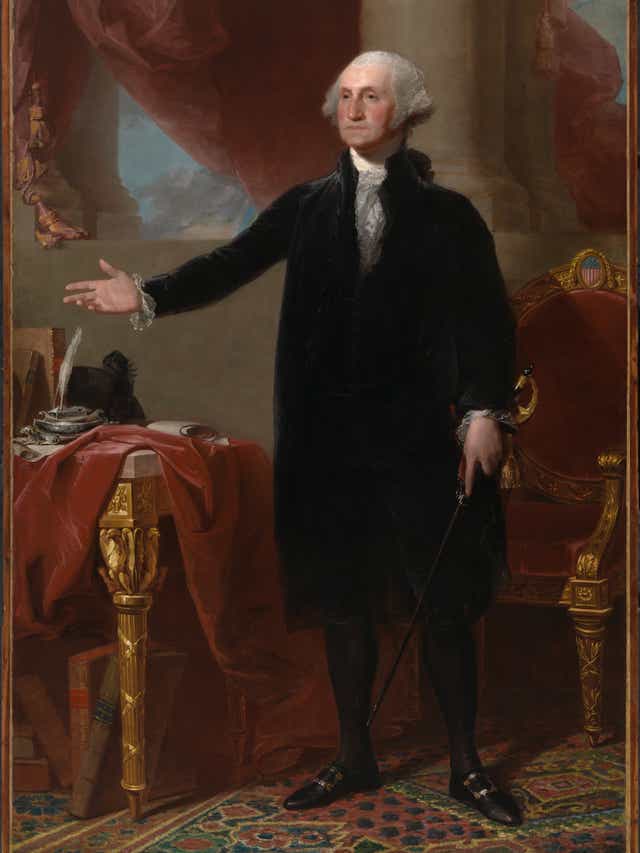Patriot, Veteran, and Father of his Country
As our Republic enters its 245th year it is appropriate that we honor the man behind the momentous and tumultuous beginnings of our country. His legacy has set us free to be the greatest nation of all time. His story is our history, rich in honor, duty and the will to be free.
Born in 1732, his father died when young George was 11 years old. It was then he went to live with his older brother Lawrence at Mount Vernon. Determined to do well on his own, he began work as a surveyor; first as an apprentice to Lord Fairfax in the Shenandoah Valley, then as surveying agent for Culpepper County, Virginia; later going over the Allegheny Mountains into the Ohio Valley as both surveyor and land speculator.
With a powerful sponsor, Lord Fairfax introduced then 20 year old George to Virginia governor Dinwiddie. Under Dinwiddie’s tutelage, he would be made a Major in the Virginia Militia setting the stage for young George to become the focus of the entire world as he was dispatched to deliver a message to vacate Virginia territory by the French interlopers. The French ignored the warning.
Dispatched once again over the Allegheny’s with a small force to remove what was thought to be a very small French contingent; he would precipitate what would become the French and Indian War in his effort to drive the French from the Ohio country.
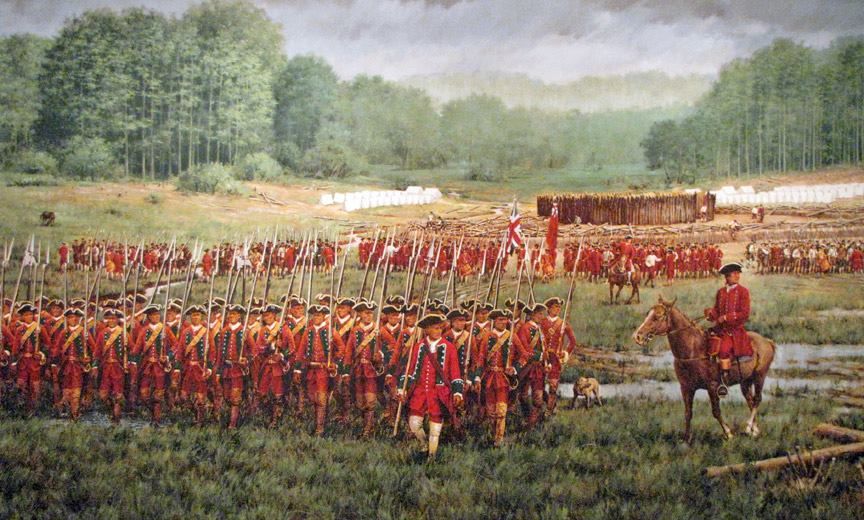
Lt. Colonel George Washington of the Virginia Colony Militia would serve as an advisor to British General Braddock. The willful General disregarded all intelligence and advice; as the inevitable attack came, it panicked the British into a rout that only the actions of Washington with the help of a couple civilian wagoners with wilderness experience, Daniel Boone and Daniel Morgan, formed a rear guard that allowed the column to withdraw to safety.
With two horses shot out from under him and numerous holes in his coat, the Legend of George Washington was born. One of the survivors was British Captain Thomas Gage. General Thomas Gage would remember the Virginia Colonel some 20 years later when General George Washington was named commander of the Continental Army.
Rebuffed by the British for a commission in the British Army, Washington returned to Mount Vernon and his first love, the land. His marriage to Mary Curtis made him one of the wealthier men of the Colony and his election to the House of Burgesses brought political interests into his sphere of influence.
He sought improved farming practices, cut production of tobacco, raised wheat, flax and other saleable crops. His work force made the things necessary to make the plantation productive. He was successful to the point that he was no longer held by financial bond to English merchants. He continued to buy English goods but often found the items, especially clothing never fit properly without extensive tailoring and the quality of questionable repute.
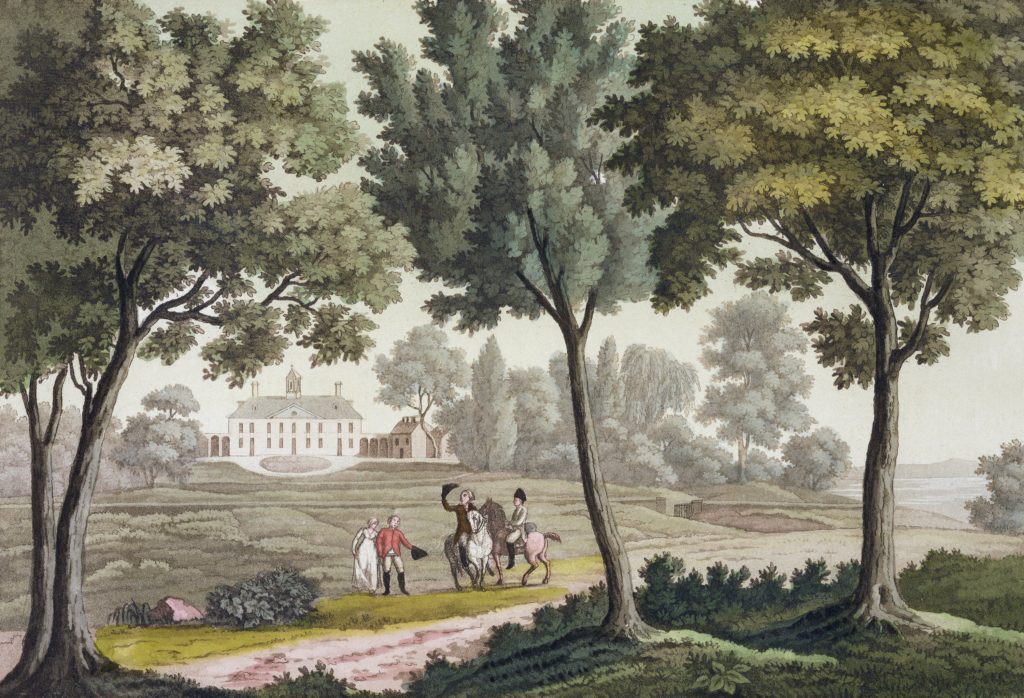
Elected to the Virginia House of Burgesses in 1759, he would serve 15 years; 1761 brought him Mount Vernon with the settlement of Lawrence Washington’s estate. In May, 1769, although no orator, he would present George Mason’s resolution calling for no taxation without representation. This theme would drive the American Revolution.
In 1773 tragedy strikes Washington’s family with the death of his step daughter Patsy in June. The Boston Tea Party in December further exacerbates the turmoil between the colonials and British Rule. Elected to the First Continental Congress in 1774; re-elected to the Second Continental Congress and finally appointed Commander of the Continental Army June 15, 1775.
The Continentals under Washington’s command would drive the British from Boston in the early part of 1776 allowing the Army to begin efforts to protect New York. The battle for Long Island would see the Continentals defeated and driven from Long Island. Washington would gather his forces on Manhattan Island and have the Declaration of Independence to his assembled troops. New York is surrounded by water, thereby allowing the British Navy to land troops in Washington’s rear, forcing them after several small skirmishes to abandon New York and seek safety in New Jersey and ultimately Pennsylvania.
As he gathered his battered troops, ordering the destruction of all boats on the north shore of the Delaware, he was finally able to rest his weary troops. The destruction of the boats would force the British commander to seek winter quarters as the weather became increasingly bad, leaving a contingent of Hessians to hold Trenton and another small contingent down river at Bordentown.
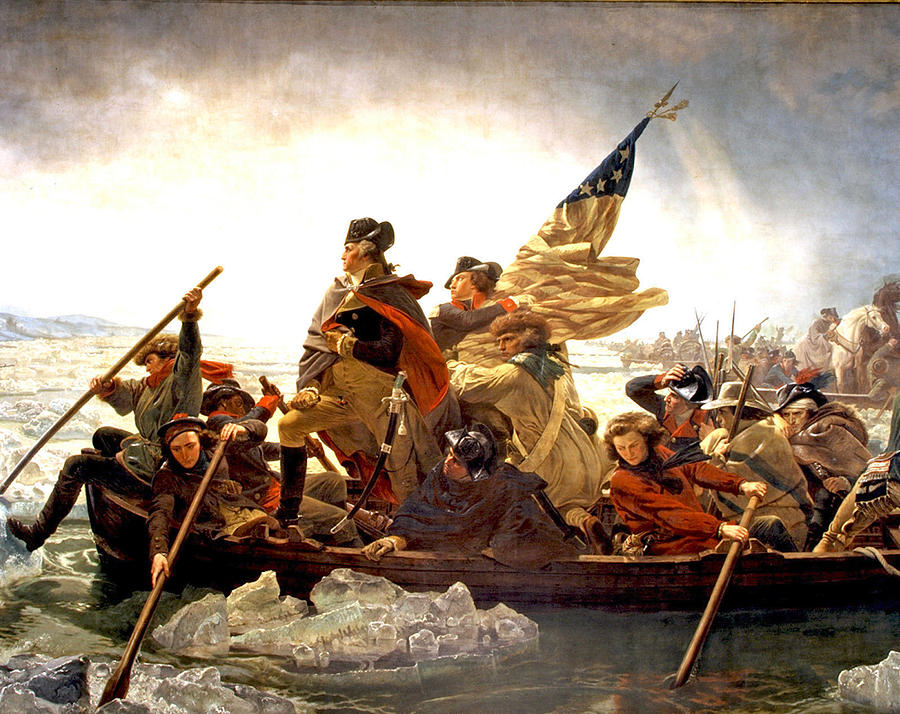
After being chased across New Jersey, Washington would cross the Delaware into Pennsylvania from which he would unleash his army against the Hessians holding Trenton, New Jersey. Besting the Hessian defenders and a few days later winning another small battle against British troops Near Princeton, New Jersey allowed Washington to take his battered but victorious and uplifted troops to winter quarters at Morristown, New Jersey.
In August of 1777 as the British approached Philadelphia, Washington’s aggressive nature wanted to defend the city but was warned by General Greene and Colonel Knox “that preserving the Continental army was a higher priority than protecting Philadelphia.” As it turned out, Washington’s Army would be defeated in the Battle of Brandywine by a flanking maneuver that split the American troops. At Germantown in October the Americans were routed as fog made identification near impossible as Americans fired on fellow Americans. Washington’s aggressive nature began to realize that he would need to subdue his nature and fight a protracted war acknowledging that preservation of the Continental Army was a priority. He would take his men to Valley Forge for the winter of 1777-78. Three men would emerge from Valley Forge that would have great impact on Washington’s life. John Marshall, future Supreme Court Judge; the Marquis de Lafayette, a gallant young Frenchman who would become “Washington’s surrogate son”; and one Friedrich Wilhelm August Heinrich Ferdinand, Baron von Steuben. Von Steuben would help Washington build a disciplined and cohesive Continental Army; an army that learned how to be an 18th century soldier that could contend with the world’s greatest military, the British Army.
Mid June 1778, General Henry Clinton decided to return his headquarters to New York and Washington decides to have General Lee harass the rear of the British column. In late June while scouting the British column the young Marquis de Lafayette blunders into the middle of the British Army precipitating the Battle of Monmouth Court House. It was during this battle that General Washington finds some of his troops in retreat, relieves General Lee on the spot, personally rallies his troops and they hold their own through the rest of the battle. Washington now knows that he has an army that can contend with the British as von Steuben’s training has shown. The French begin to realize that the American’s can stand up to the British and join the American Revolution on the side of the Americans. Unbeknownst to Washington, this will be his last major action until he traps General Cornwallis and his troops at Yorktown.
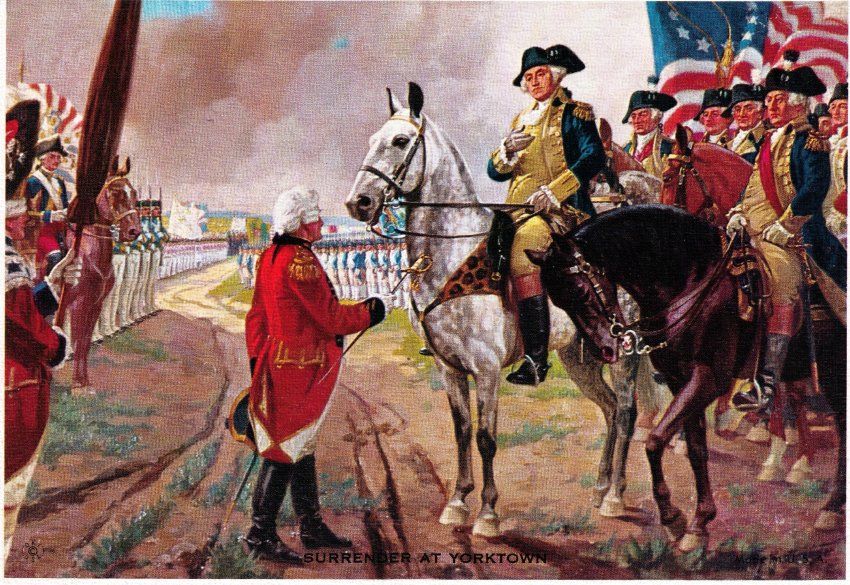
In August 1781 after a bruising campaign in the south General Cornwallis begins a march towards the Virginia tidewater and finds himself trapped at Yorktown. After a near two month siege, Cornwallis surrenders his army to Washington. Personal tragedy will again strike as Washington’s step son Jack dies November 5, 1781.
February 4, 1783 the British make notification of the cease of hostilities and ratification of the Treaty of Paris, September 3, 1783 brought to an end the War of Independence. Washington would say farewell to the Army November 2, 1783 and on December 23rd tenders his resignation and surrenders his commission to congress.
After a three and a half year hiatus from public life, on May 5, 1787 Citizen Washington is elected President of the Constitutional Convention; subsequently elected First President of the United States, April 17, 1789 and elected to a second term February 13, 1793. He would issue his “Neutrality Proclamation, April 22, 1793 and see the Jay Treaty of 1794 ratified.
On September 19, 1796 he published his Farewell Address to the nation.
NOTE: I have taken the liberty to parse his Farewell Address, but one can’t help but feel the man’s interest in the young country and what it will mean to future generations.
…I have with good intentions, contributed towards the organization and administration of the government, the best exertions of which a very fallible judgment was capable. Not unconscious, in the outset, of the inferiority of my qualifications…
…my feelings do not permit me to suspend the deep acknowledgement of that debt of gratitude which I owe to my beloved country… still more for the steadfast confidence with which it has supported me…
… a solicitude for your welfare, which cannot end but with my life, and the apprehension of danger, natural to that solicitude, urge me on an occasion like the present, to offer to your solemn contemplation, and to recommend to your frequent review, some sentiments, which are the result of much reflection, of no inconsiderable observation, and which appear to me all important to the permanency of your felicity as a People.
Interwoven as is the love of liberty with every ligament of your hearts, no recommendation of mine is necessary to fortify or confirm the attachment. …
Unity of government… … is a main pillar in your independence… it is easy to foresee, that from different causes and from different quarters, much pains will be taken, many artifices employed, to weaken in your minds the conviction of this truth…
Union, think of it as the Palladium of your political safety and prosperity…
The name of American, which belongs to you, in your national capacity, must always exalt the just pride of Patriotism…
Respect for its authority, (the government) compliance with its laws, acquiescence in its measures, are duties enjoined by the fundamental maxims of true Liberty.
Let me warn you in the most solemn manner against the baneful effects of the spirit of party… This spirit, unfortunately, is inseparable from our nature…
Of all the dispositions and habits which lead to political prosperity, Religion and Morality are indispensable supports.
Observe good faith and justice towards all Nations; cultivate peace and harmony with all…
…attachments to foreign influence is particularly alarming to the truly enlightened and independent Patriot…
Against the insidious wiles of foreign influence the jealousy of a free people ought to be constantly awake; since history and experience prove that foreign influence is one of most baneful foes of Republican Government.
“T is our true policy to steer clear of permanent alliances, with any portion of the foreign world… There can be no greater error than to expect, or calculate upon real favours from nation to nation.
How far in the discharge of my official duties, I have been guided by the principles which have been delineated, the public records and other evidences of my conduct must witness to you and to the world. To myself, the assurance of my own conscience is, that I have at least believed myself guided by them.
I promise myself to realize, without alloy, the sweet enjoyment of partaking, in the midst of my fellow citizens, the benign influence of good laws under a free government…
Washington was a very humble human being that accepted his own fallibility and recognized the faults of others with grace and magnanimity. His message to his countrymen is as pertinent today as it was when it was published. His love of America was and is a bright reflection of a man who was the “father of his country”.
In March 1797 Washington retired to his beloved Mount Vernon.
Walt Mow 2020
